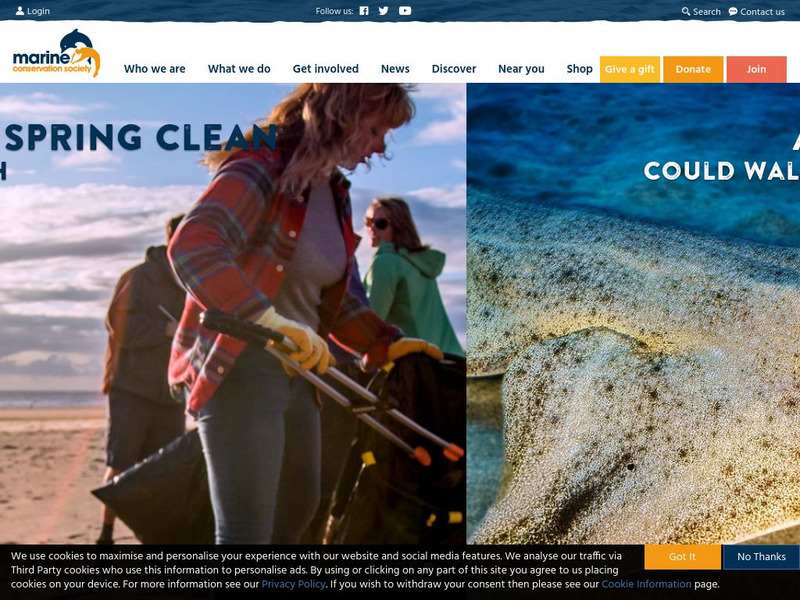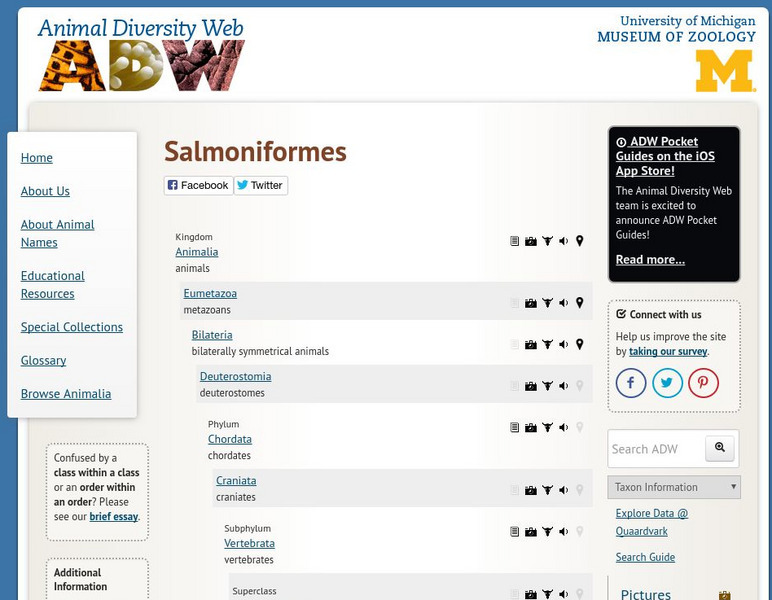Hi, what do you want to do?
BiologyWise
Biology Wise: Classification and Characteristics of Rotifers
Outlines the classification hierarchy of the phylum Rotifera and describes their characteristics and anatomy. Rotifera have survived for up to 80 million years and continue to play an important role in ecological systems.
University of Illinois
University of Illinois Extension: Urban Text: Adventures of Herman the Worm
WORMS- What are they? Where did they come from? If you are interested in Herman the Worm's family tree (biologically speaking), his body structures, or all the facts about him that you'll ever need, go to "The Adventures of Herman the...
Other
Mcsuk: Seas Fit for Life
In this thorough site, you will find lots of teacher resources including marine environmental issues.
Enchanted Learning
Enchanted Learning: Names of Animals, Babies, and Groups
Do you know what a baby elephant is called? How about the name for a group of gerbils? This site from Enchanted Learning provides information about male, female, baby, and group names of many animals. Click on the animal name to find...
PBS
Nh Pbs: Nature Works: American Black Bear
Learn more about the American Black Bear through this informative resource. Gain a new perspective of this mighty animal when you learn more about its' habitat, behavior, characteristics, and more.
Sea World Parks & Entertainment
Animal Bytes: African Cape Buffalo
Provides users with a concise list of information helpful to anyone wanting to know more about these South African ungulates. Contains scientific classification of these animals, fast facts, fun facts as well as additional information on...
Sea World Parks & Entertainment
Animal Bytes: African Elephant
Resource for anyone seeking information on these huge creatures. Provides scientific classification of African Elephants, fast facts, fun facts as well as additional information on ecology and conservation.
Environmental Education for Kids
Eek!: Leave Animals in the Wild
Discover what you need to know about what makes an animal wild, including the time and energy it takes to keep a wild animal, well, wild.
Other
Mammals and Their Babies
Twelve mammal baby pictures are displayed in this resource. If you roll your mouse over a picture you can see the adult version of the same animal.
Regents of the University of Michigan
Animal Diversity Web: African Buffalo
General reference material on the African, or Cape, buffalo, with information about physical characteristics, geographic range, classification, reproduction, behavior, and habitat.
Sea World Parks & Entertainment
Sea World: Animal Bytes: African Hedgehog
Brief, but concise resource contains helpful information on this little creature. Provides scientific classification of the African hedgehog, fast facts, fun facts as well as additional information on ecology and conservation.
Wikimedia
Wikipedia: Mammal
Wikipedia, an open-source encyclopedia, provides great information on mammals. Content includes a look at mammal characteristics, origins, classification, and more.
Regents of the University of Michigan
Animal Diversity Web: Salmoniformes
A brief overview of the Salmoniformes Order of fish. These fish are very important to humans economically. Many of them are pictured in the photos on this site.
Regents of the University of Michigan
Animal Diversity Web: Class Polychaeta
Resource provides a general description of marine worms, including sand worms, tube worms and clam worms.
Smithsonian Institution
Smithsonian National Zoo: Meet Our Animals
This site from the National Zoological Park provides extensive information about many types of animals. Just click on the category you need. Includes pictures and live web cams.
Biology 4 kids
Biology4 Kids: The Top Four Kingdoms
Read about the four most familiar kingdoms: fungi, plant, animal, and protist.
Science Education Resource Center at Carleton College
Serc: Mn Step: Water Retention No Problem With the Key Investigation
Students go outside to a nearby pond or wet area, and collect vertebrates and invertebrates. These are identified using a classification key. Information is recorded using a digital camera and a science notebook. Students later prepare a...
Other
Illinois Wesleyan Univ.: Tardigrade Species Distribution Project: Lesson Plan
This lesson plan was for classes that participated in a research project on tardigrades that took place in 1999. Tardigrades, also known as water bears, are fascinating, tiny creatures that can survive under the most extreme conditions....
Sheppard Software
Sheppard Software: Animal Profiles: Spiders
In-depth description of a spider, including its behavior, appearance, reproduction, and classification.
San Diego Zoo Global
San Diego Zoo: Bald Eagle
This resource presents a complete fact sheet on bald eagles that includes a look at why bald eagles are "bald," what bald eagles eat, how their vision works, their courtship and mating behavior, their nesting and reproductive behaviors,...
Georgia Department of Education
Ga Virtual Learning: Ap Biology: Animals
This unit focuses on the unique structure and function of both invertebrate and vertebrate animals. Students review their understanding of animal diversity, and take a closer look at the various organ systems found in the animal kingdom.
PBS
Pbs: Nature: What Females Want, Wildlife and Sexual Selection
This two-part video series explores how females and males relate to each other in the animal kingdom. It shows how the strategies that males and females use to attract each other impact on the evolution of a species.
TeachEngineering
Teach Engineering: Biodomes
Students explore the biosphere's environments and ecosystems, learning along the way about the plants, animals, resources and natural cycles of our planet. Over the course of lessons 2-6, students use their growing understanding of...
University of California
University of California Museum of Paleontology: The Arthropod Story
Go back in time to discover the evolutionary story of the arthropod and what this phylum of the animal kingdom looks like today.



























